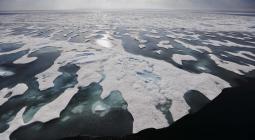Ocean temperatures ‘relentlessly increasing’ due to climate crisis

Scientists warn of greater likelihood of extreme weather, heightened risks posed by sea level rise and lower carbon absorption by oceans after sixth straight year of record breaking temperatures
The world’s oceans are hotter than ever before, continuing their record-breaking temperature streak for the sixth year in a row, US and Chinese scientists have said.
The upper 2,000 metres of water in all oceans absorbed 14 times as much energy over 2021 than they did over 2020, with the difference equal to 145 times the entire world’s energy generation for 2020, researchers said.
“The ocean heat content is relentlessly increasing, globally, and this is a primary indicator of human-induced climate change,” said paper author Kevin Trenberth, distinguished scholar at the National Center for Atmospheric Research in Colorado.
The rapid heating of the oceans as the planet warms also has a major impact on future warming, making it increasingly difficult to slow down.
Lijing Cheng, lead paper author and associate professor at the Chinese Academy of Sciences said: “As well as absorbing heat, currently, the ocean absorbs 20 to 30 per cent of human carbon dioxide emissions, leading to ocean acidification.
"However, ocean warming reduces the efficiency of oceanic carbon uptake and leaves more carbon dioxide in the air. Monitoring and understanding the heat and carbon coupling in the future are important to track climate change mitigation goals.”
The researchers also assessed the role of various natural variations, such as the warming and cooling phases known as El Niño and La Niña, which greatly affect regional temperature changes.
These regional analyses revealed that "robust and significant ocean warming since the late 1950s occurs everywhere".
Nevertheless, regional marine heat waves are also a consequence "with huge impacts on marine life", the researchers said.
“Our previous work showed that scientists need less than four years of ocean heat measurements to detect a human-induced warming signal from natural variations,” said Professor John Abraham from the University of St Thomas, in Minnesota.
This is much less time than the almost three decades of records required to detect global warming using air temperatures near the Earth’s surface.
"Ocean heat content is one of the best indicators of climate change.” Professor Abraham added.
As well as warming oceans being unable to absorb humanity’s spiralling carbon dioxide output, the increase in energy as a result means the oceans are physically expanding, adding to sea level rise, and raising the risk of extreme weather
Dr Cheng said: “With model experiments, our study shows that the pattern of ocean warming is a result of human-related changes in atmospheric composition.
“As oceans warm, the water expands and sea level rises. Warmer oceans also supercharge weather systems, creating more powerful storms and hurricanes, as well as increasing precipitation and flood risk.”
“The oceans are absorbing most of the heating from human carbon emissions,” said paper author Michael Mann, distinguished professor of atmospheric science at Pennsylvania State University.
“Until we reach net zero emissions, that heating will continue, and we’ll continue to break ocean heat content records, as we did this year. Better awareness and understanding of the oceans are a basis for the actions to combat climate change.”
The research is published in Advances in Atmospheric Sciences.
Harry Cockburn Environment Correspondent
cover photo:
A tornado over the Mediterranean Sea. The climate crisis is warming oceans, making extreme weather more likely






